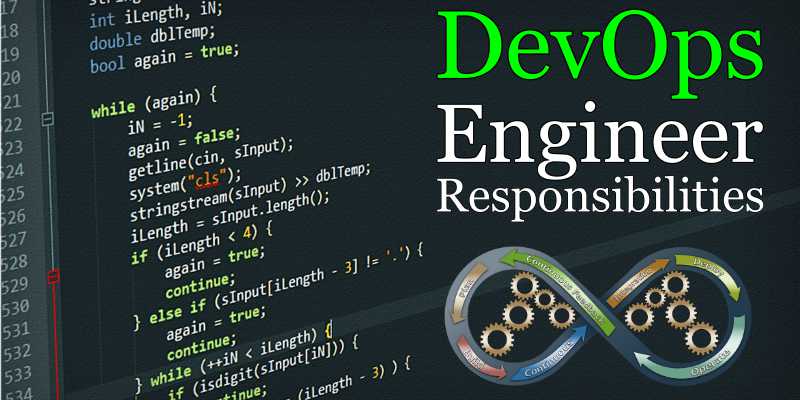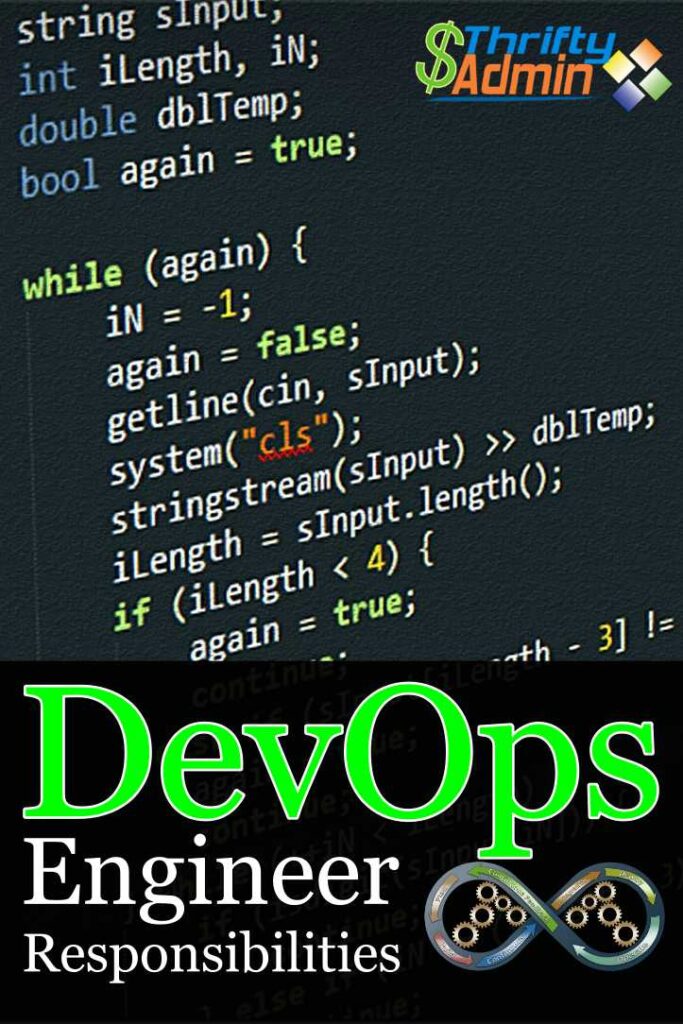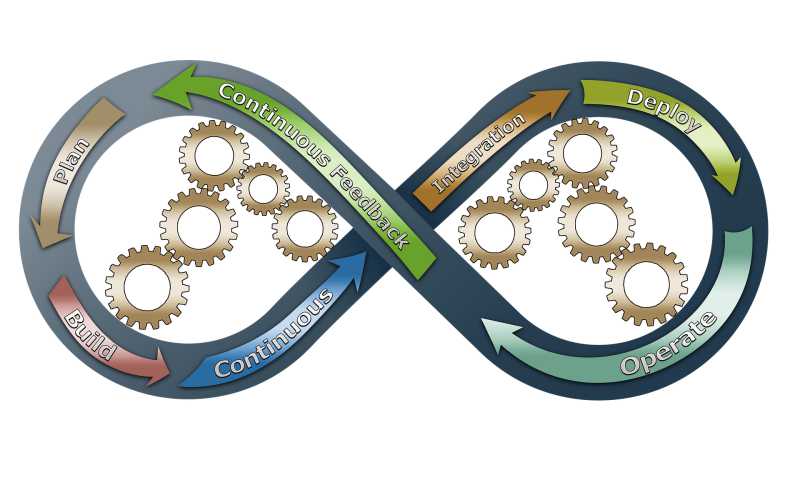DevOps Engineer Responsibilities

A DevOps engineer responsibilities are mostly concerned about successfully automating code releases into production. They work on a continuous deployment cycle and try to avoid any problems to IT systems in the approach.
In the modern age of continuous deployment, DevOps engineers are a critical part of IT since they bridge the gap between development and IT operations often having broad knowledge of both technologies.

Why learn about DevOps? Most companies are deploying a more agile and DevOps approach to production releases. Knowing more about the DevOps process is a critical in quickly getting new services into production with a little disruption as possible.
The purpose of this article is to teach you about DevOps, explain DevOps engineer responsibilities in IT, and to tell you about the tools and skills needed to be a better DevOps engineer.
Before we tackle a DevOps engineer responsibilities are, we should first take a look at what the DevOps approach means.
What is DevOps?
DevOps is a software development strategy which bridges the gap between the developers and the IT staff. It makes sure all IT and business needs are meet in the development project.
DevOps is a culture that is being followed by many organization. It is a continuous process of updates and work flows.
To over simplify the goal of DevOps, it is a constant flow of small code improvements to build the product over time with little disruption to production. This is very different then the waterfall development approach which builds the product as close to perfect from the start. The approach is supposed to bring features and fixes to market more quickly then the traditional waterfall development method.
DevOps Goals
Another goal of DevOps is to increase the quality of changes and to increase the collaboration of teams (Development, Security, and Operation) so that the workflow within the organization becomes smoother. Deploying small changes often is easier and more reliable if a proven method of testing and back-outs is build into the DevOps process.
Most people think that DevOps is only about deploying new software into production, but in my opinion it can be applied to many part of a business. In my role, I am a DevOps engineer that manages the deployment of cloud services into the IBM cloud. Not all of it is new software developed by programmers. Its just Work in Progress (WIP) and we use the DevOps and Agile approach with great success.
DevOps Engineer Responsibilities
A DevOps Engineer is responsible for managing software deployments into IT infrastructure as per the business needs. The code can be deployed in hybrid multi-tenant environment which needs continuous performance monitoring.
Monitoring the current infrastructure and workflows is a core responsibility of a DevOps engineer. They keep the flow of changes flowing without problems backing up the system. You can almost call them the plumbers of IT.
The Main Responsibilities of a DevOps Engineer are to:
- Understand the needs of the business, and partner to create solutions that support business and technical strategies and goals
- Work closely with development teams to ensure that solutions are designed with customer user experience, scale/performance and operability in mind
- Ensure delivery of technical solutions
- Maintain strong expertise and knowledge of current and emerging technology and tools
- Write scripts and automation using PowerShell/Perl/Python/Groovy/Java/Bash
- Utilize various open source technologies
- Solid understanding of Networking
- Manage source control including SVN and GIT
- Solid understanding of Security
- Identifies and resolves problems in a timely manner
- Design, build and maintain the CI/CD infrastructure and tools
- Use various tools to orchestrate solutions
- Build independent web based tools, microservices and solutions
- Configure and manage data sources like MySQL, Mongo, Elasticsearch, Redis, Cassandra, Hadoop, etc
- Understand how IT operations are managed
- Be totally hands on and have the ability to work independently
DevOps Engineer Experience
It is almost impossible to learn about DevOps in school. A great DevOps engineer has over 10+ years of experience developing, working IT ops, and communicating between departments getting work done.
Communication skills are probably the most important non-technical skill you can learn as a DevOps engineer. Relaying technical information between organizations is critical. You are the bridge between different networks translating work so important issues are not missed.
For example, understanding security risks and then relaying those risks in a way to development and ops so the risks can be developed in the product (from the start) will reduce technical debt in the long run and produce a better product. Then you can automate the deployment taking the human risk out of the deployment. This is something that experience will teach you over time if you are keen enough to pay attention.
Most job descriptions will list the following required experience but this is just the tip of the ice berg.
DevOps Engineer Experience
- Knowledge of one cloud platform (AWS, Azure, GCP)
- Good hands-on knowledge of Configuration Management and Deployment tools like – Puppet, Ansible, Chef, Terraform etc.
- Proficient in scripting, and Git and Git workflows
- Experience in developing Continuous Integration/ Continuous Delivery pipelines (CI/ CD)
There is an endless array of tools and technologies and it is impossible to have someone with experience in all, but having an understanding of the tools and method should be your goal. For example, there is little need to have experience in all configuration management tools but having experience in one should be desired. Learning the others will not be difficult once you have a working knowledge with one of them.

DevOps Engineer Skills and Tools
The most critical skill in any DevOps engineer is to always have a passion to learn and grow. In the world today, the IT environment changes drastically every few months. A DevOps engineer needs to understand these changes to make sure the business needs are being meet with the most current technologies.
A good DevOps Engineer will have experience in several modern tools to help them manage and monitor the environment.
Open Source DevOps Tools
- Git and GitHub – Source code management (Version Control System)
- Jenkins – Automation server, with plugins built for developing CI/ CD pipelines
- Selenium – Automation testing
- Docker – Software Containerization Platform
- Kubernetes – Container Orchestration tool
- Puppet – Configuration Management and Deployment
- Chef – Configuration Management and Deployment
- Ansible – Configuration Management and Deployment
- Nagios – Continuous Monitoring
Most businesses love to work with Open Source software and often this is difficult to learn and deploy. Modern applications are often using an Agile deployment method meaning features and bugs could prevent the business from using it in production. Using this development method will mean the software will never be finished but in this case, close enough is your goal.

The Phoenix Project
If you are really interested in learning more about DevOps, I highly recommend you read 2 books. The first is The Phoenix Project and the second is The DevOps Handbook.
These are both great books. The Phoenix Project is about a newly promoted VP of Information Technology and his adaptation of DevOps principles. In the book, they go over core principles of WIP (Work in Progress) and the 4 types of work. These are at the core of DevOps principles and a required read in my opinion.
The Three (3) Ways:
- Systems Thinking. This is the performance of the entire system as a whole.
- Amplify Feedback Loops. This is so necessary corrections can be continually made.
- Culture of Experimentation and Learning. Continual experimentation, taking risks and learning from failure. The second, learning, is understanding that repetition and practice is the prerequisite to mastery
The 4 Types of Work are:
- Business Projects (Custom focused)
- Maintenance Projects (IT Ops Focused)
- Planned Work (Changes and Maintenance items)
- Unplanned Work (the productive killer)
DevOps Handbook

This DevOps Handbook is a worthy sequel to The Phoenix Project. It used a fictional story to help the reader understand the “why” of DevOps and what a successful end state looks like.
In The DevOps Handbook the same set of authors continue where they left off, this time explaining the “how” of DevOps, how the three Ways (flow, feedback, continuous learning) are implemented in practice. This book lets you see through the current hype around DevOps, much of it coming from tool vendors positioning their various “solutions” as silver bullet, putting the technology in its rightful place beside people and process.
While in the Flow section there is plenty on continuous integration and continuous delivery (CI/CD) that for most people is what first comes to mind when they think of DevOps. To me the most valuable sections are the principles of feedback and the various case studies from the companies with the most mature DevOps practices. The book ends on a great note with the appendix, which elaborates on the lean principles on which the theoretical framework behind DevOps is built, a how to guide on “blameless postmortems”, and an extensive list of references, most of them with URLs, so that the reader can drill down on all the subjects covered.
If you are a manager or even just someone wanting to learn more about DevOps, read these books.
Conclusion
I hope this is a clear example of modern DevOps engineer responsibilities and delivers a path to take either your organization or yourself into a DevOps role. This article didn’t talk mush about the benefits of adopting DevOps in your organization or why adapting DevOps skills will make you a better engineer. That article will be coming shortly.
If you liked this DevOps engineer responsibilities article, consider leaving a comment or signing up for our email list so you can be the first to hear about new articles. Thank you for reading and best of luck in your journey into DevOps!


